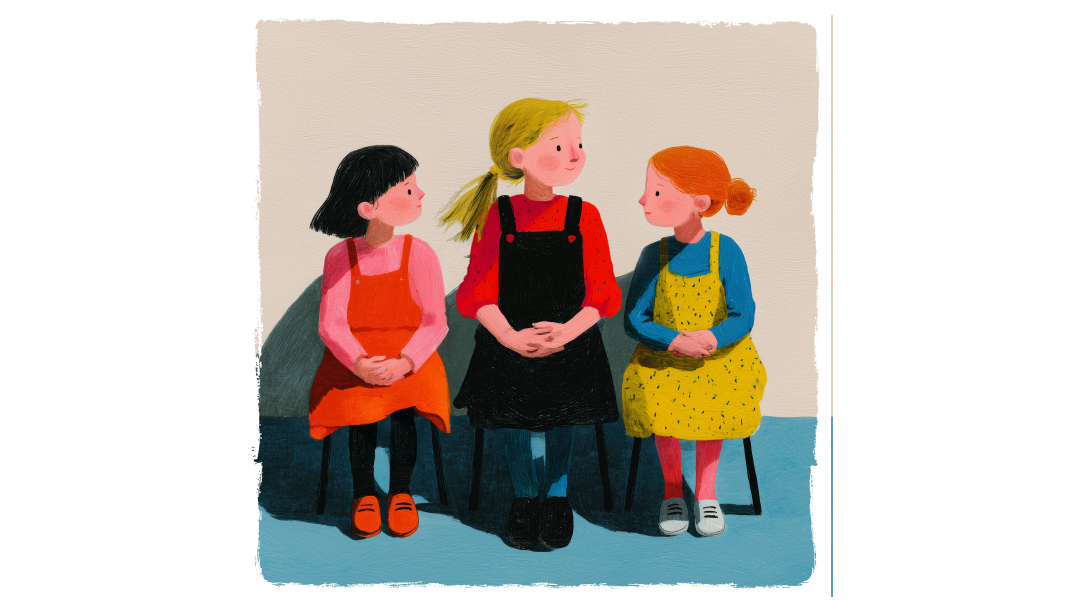Can Non-maternal Women Succeed at Motherhood?


Some mothers simply don’t feel maternal in the way society expects them to. Often these women feel like there’s something wrong with them — they’re not living up to the expectations of a Jewish mother. Can motherhood be expressed in different ways?

By Miriam Kosman
Part I: I Mind, You Matter
M
otherhood is put on a pedestal in Judaism.
This works well for the women who are naturally nurturing, who love small children, and who might choose kindergarten teacher as their dream job.
But what about those women whose teeth are set on edge by board games, who — even as they’re inspired by the image of happy children braiding challah with their calm and patient mother — would find doing so a minor form of torture?
What can we say to women who aren’t naturally attuned to the joys of being around small bodies and minds, who, though they love their children deeply, find the thought of spending years and years picking up Lego and spooning applesauce into little mouths daunting?
For some mothers, it might be comforting to remember that while those early years of hard physical labor, little sleep, and constantly being on call that early childhood demands are fundamental, they’re not the sum total of the mothering mission. Mothering continues during the teenage years and goes on after your children are married, and each of those periods of life require completely different skill sets.
Sometimes, those mothers who are not that great at toilet training and pushing kids on swings excel at schmoozing with teenagers or being supportive of their young couples. It’s reductionism of the highest order to frame mothering as diaper changing and bedtime stories. At the same time, it is equally dishonest to ignore the fact that parenting requires years and years of sometimes tedious, often draining, always demanding work, and the sacrifice of many, many druthers.
The Ultimate Treasure
Why is having children such an ultimate value in Judaism? And make no mistake about it — it is. Bearing and raising children is probably the most cherished and important thing a Jew can do. Halachically, having children trumps almost everything else in importance.
One reason is because when we have children we’re doing what Hashem adjures us to do in Devarim (30:19). By having children, we “choose life.” Choosing life is not a slogan. It’s a minute-by-minute commitment not to be lulled into a vapid stupor by the onslaught of superficiality with which Western society indoctrinates us — where quality of life is synonymous with comfort and not too much noise or mess. “Choosing life” is holding on tightly with both hands to the idea that life is quality.
The Midrash, in a play on words, tells us that the verse “Kol neshamah tehallel kah, every soul will praise G-d,” can also be read as every breath (neshimah) praises G-d. Each and every breath of a human being — just being alive — is a validation of the greatness of G-d who wondrously enables an eternal soul to reside within a finite, physical body. This is true even without a person’s conscious awareness — how much more so if they fill their days with acts of kiddush hashem, i.e. struggling, however unsuccessfully, to give expression to that soul — which we hope and pray our children will do.
It’s not a coincidence that the more secular a society becomes, the more their birth rate plummets. The desire for children is a direct result of being in a passionate relationship with G-d. If life has no ultimate meaning, then we live, we die, and we try to have some fun in between — and children, certainly many children — are not all that conducive to fun.
But if life has meaning, then I’m on a mission and the nature of a mission is to spill outward into other lives. A life seriously lived overflows into a desire for children.
Hashem promises progeny to Avraham “Because I know that he will command his children and his household after him to guard the way of Hashem” (Bereishis, 18:19). The burning desire to touch the future makes the clearest statement about our relationship with Hashem in the present. Children are a spillover of our passionate relationship with Hashem into the next generation.
People, Glorious People
The gift of children is the gift of being granted a chelek in yishuv ha’olam, of populating the world with human beings who will lift this world out of purposeless anarchy and bring it to a place where His greatness is revealed. “Not for chaos did G-d create the world, but to be populated with civilization” (Yeshayah, 45:18).
And however many children we bring into the world, we’re told never to be satisfied. Rashi in Koheles (11:6) tells us, even if you learned Torah in your youth, keep on learning even when you get old. Even if you gave tzedakah when you were young, keep on giving it when you get old. And even if you are blessed with children, never consider the ones you have now enough.
As Rambam famously tells us, each and every additional child is a vast and infinite opportunity to bring the world to its ultimate purpose: “Even if you have other children, adding one soul to the Jewish people, is… compared to building a world” (hilchos ishus, 15:16).
For someone who values life, there is nothing this world has to offer — not the most worthwhile career and not even opportunities to spiritually influence others for the better — which can compete with the immensity of having children.
Fun Does Not Equal Pleasure
Knowing this, however, does not necessarily turn us all into earth mothers who adore answering questions before six a.m. about why ants walk single file. Which, when you think about it, is completely okay.
For some reason, there seems to be a cross-cultural expectation that women be “naturally” attuned to motherhood — even as we specifically admire men who are mind over matter and do things against their nature. An integral part of being human, though, whether you’re woman or man, is the ability to go beyond one’s natural inclinations and do what one’s mind and heart tells us is right.
Some men love learning, others do it only because they know they have to. Some men love the attention to detail involved in analyzing esrogim for hours, others have zero proclivity for it, but may do so anyway because they think it’s important in order to develop chavivus hamitzvah or for dikduk halachah. Some roshei yeshivah might, by nature, prefer learning to counseling a bochur about shidduchim, while others might feel the exact opposite.
Greatness is when you do something lovingly and happily even when it’s not your natural inclination, because you’ve made the conscious decision that this is what Hashem wants from you at this minute. We express our humanity when we use our intellect, our awareness, and our very souls to decide how and where we’re going to invest our time and energies.
Interestingly, this push and pull between our natural inclinations and our spiritual drive to do the right thing is brought out specifically through a woman. Chana — the mother of Shmuel, seems to see nature as a reasonable claim on G-d. She says to Hashem, You gave me the body of a woman — obviously designed to birth and nurture — how can You not allow me to use that body to have a child?
Yet, while it may have been her natural maternal drives that were the impetus for her heartfelt prayer, what made her great was her rising above her primeval longings and her natural “mother-bear” nurturing instincts and tapping into her higher, soul-conscious self. It was going against her nature which allowed her to dedicate her child to G-d. Surely bringing Shmuel up to Shilo as soon as he was weaned crashed with every fiber of her “natural” mothering instinct, and yet, it was that act of going against her nature — of reaching deep inside herself, to find her real prayer — that not only produced Shmuel, but gave the Jewish People the template for prayer forever.
The truth is that our personal inclinations, talents, and abilities were given to us by Hashem, and as we know — but often forget — Hashem doesn’t make mistakes. The fact that we may not be naturally inclined to love the non-ending physical care, the noise and mess, the philosophical discussions about bedtime, the need to be consistently “on”, is not necessarily in our hands.
What’s in our hands is how we do things, and what thoughts we tell ourselves about what we’re doing.
Getting off the Grandstand
Some of the angst around this topic stems, perhaps, from the tendency in our society to rhapsodize about “the Role of the Jewish Woman.” But if we look to our sources, it’s not that clear that women (or men) actually have a specific role. Or, more to the point, at the end of the day “the role of the Jewish woman” turns out to be exactly the same as the role of the Jewish man: Do what Hashem wants of you in the particular situation that you find yourself (regardless of whether you love every aspect of it).
For some men, doing what Hashem wants might mean developing their nurturing side, learning to communicate effectively, changing diapers, and taking care of small children (check out a kollel home during lunch time when the wife is still at work… or even a three-year-old cheder classroom).
And for some women, doing what Hashem wants of them might involve being merchants as in Eishes Chayil, winning over evil like Esther Hamalkah, fighting wars like Devorah Haneviah, manipulating outcomes like Rivka Imeinu, being innovative, daring, and determined like Miriam Haneviah… or maneuvering a stroller and a bunch of kvetchy children through a parking lot, and doing multiplication tables with a recalcitrant learner.
Was Recha Shternbuch, who saved thousands of lives in the Holocaust — and who probably didn’t spend a lot of time folding laundry — a great Jewish woman? What about childless Sarah Schneirer?
Indeed, it’s possible that sometimes Hashem specifically doesn’t grant a woman children in order that she be free to do something different with her life. Rav Zalman Sorotzkin ztz”l maintains in his Oznaim LaTorah that not only was Sarah Imeinu childless for most of her life, but Hashem did not even give her a womb, in order that she not have “even a flicker of hope of having children in a natural way” so she’d be able to “devote her entire soul and being to the holy mission of bringing people back to Hashem.”
Of course, Sara’s barrenness was a Divine decree, not something she chose for herself. The question of what would have happened to Klal Yisrael if Sara Schneirer had merited to have a family, in which case she would probably not have started Bais Yaakov, isn’t a question we need to deal with. We learn from Chizkiyahu Hamelech, who was faulted for avoiding having children (since he knew they’d be wicked), that our responsibility is to bring children into the world, not to second-guess Hashem.
But the idea that a woman’s tafkid is broader and more all-encompassing — and involves all aspects of her being — is still true. Even a woman blessed with a large family will still have many years of life — and many areas of life, even within her childbearing years — which will not be connected to mothering or home-making.
Children Versus Rèsumès
Still, a woman who understands the value of children may indeed have to give up wonderful, fulfilling, fun, and even very worthwhile opportunities. Even if she could have been a high-powered lawyer or surgeon, even if she could have touched people’s souls through music or art or literature, she may choose not to, because she’s cognizant of the supreme value of life.
For a person unfamiliar with Torah values, it would be hard to understand how a woman can choose to give up “developing” herself and her career in order to spend her life changing diapers and making sandwiches. She could’ve had a wildly successful advertising agency or hedge fund, and instead she’s fanning away flies in the playground!
But if after 120 years a person comes to Heaven without an impressive résumé, yet with having tried to the best of their abilities to bring emotionally and spiritually healthy avdei Hashem into the world, we believe they will not lose out. The converse — arriving up there with an impressive résumé bought by choosing “self-development” over having children — may not fly as well in a World of Truth.
As an aside, self-development in Western lingo is often just a euphemism for developing the professional skills needed to “succeed.” While it’s true that any endeavor we’re involved in has the potential to help us know ourselves on a deeper level — and in that way, self-develop — there’s no question that it’s in the area of our intimate relationships with the people closest to us that we are offered the most intense opportunities to truly develop ourselves as human beings.
Show Up
Beyond all the philosophical pontificating, the thing about having children, as Erma Bombeck pithily pointed out, is that once you have them, you have them.
That simple truth — ultimate tafkidim notwithstanding — requires all hands on the deck. The basic, brutally honest truth is that children need their mothers and they need their mothers present. The most important things mothers do for children can’t be delegated (although lots of the menial tasks surrounding mothering certainly can).
Children need their mothers to be interested in who they are and what they do, they need their mothers to love them unconditionally, they need their mothers to model the right way to be and the right perspective on life. And they need to be around their mothers enough for all of this to be impactful.
Despite what we’ve been told, quantity time is quality time. This is true whether your child is 15 months old or 15 years old. Mothering is about being there, often in the background. It’s because you’re there that you know the rhythm of your child’s life. It’s because you’re there that those transformative moments of revelation suddenly happen.
And as an interesting side point, if you do it well, it doesn’t really matter that you didn’t love it. The bochur being counseled does not ever need to know that the rosh yeshivah might have stifled an inward groan when he came in — and your child doesn’t have to know that given your druthers you would prefer gazing at the stars, or having a cappuccino with a friend, to sitting squished on the couch with five squirmy bodies reading the same book for the hundredth time.
Sometimes it happens that years down the road, one of those toddlers whom you found so challenging (and who has, in the meantime, shockingly, turned into an adult) says or does something that warms your heart, and you recognize your own input. And you discover something fascinating. Feelings dissipate, actions leave their mark forever.
Even if your teeth were falling asleep from boredom on that park bench, you were still there. Even if you could think of a million things you’d have rather been doing than making a tent out of blankets on a boring Sunday afternoon, you were there, and so were the creative tents — and so was the lesson that you can make lemonade out of lemons. And that is what made an impression.
You don’t have to love the nuts and bolts of mothering. You have to believe in the vision. Through our children we touch eternity, but as with many crucial things in life, the wrappings can be less than enthralling. That doesn’t make them less eternal.
As the famous line goes: “When there’s a ‘why,’ any ‘how’ is possible.” Mind over matter doesn’t mean plodding along resignedly because there’s no choice. Mind over matter means a conscious choosing to see the big picture.
In this sense, parenting is a metaphor for the life of the Jew — a soaring vision translated into thousands of plodding details. Judaism isn’t about what comes naturally to you. It’s about keeping one’s eyes on eternity, tapping into the reservoirs of joy, there for the taking when we choose life.
Part II: Mother Load

By Elisheva Appel
“I
’m missing that maternal instinct,” says Rivka matter-of-factly. Already from a young age, her friends dreamed of the day they’d have babies, but it was never something she thought much about. When she first became an aunt during high school, she dutifully papered her loose-leaf with photos of toothless babies, but didn’t felt deeply connected to them.
“I knew I was supposed to gush over my nieces and nephews, but they were just boring. What was I supposed to do with them? You smiled, yay, now what? Kids didn’t scare me, they just baffled me,” she clarifies.
During her first pregnancy, she never felt the maternal stirrings of a prenatal bond and didn’t consider herself particularly attached to the tenant inhabiting her body… until he vacated the premises. “Once he was born, it was incredible. This is my kid!
“The first time my friend heard me speak to my toddler in a high-pitched voice,” she remembers, “she was shocked. ‘You have a baby voice?!’ ”
Still, Rivka has discovered that liking and loving are two separate experiences. “I love my kids, but don’t always like them. I compartmentalize sometimes; loving a child doesn’t mean I always enjoy spending time with him.”
Perel, an enthusiastic mother and successful therapist from Boro Park, says her ambivalence toward motherhood was not so much about bonding with small, underdeveloped people, but more about the mundane aspects of the job description.
“I’m crazy over my kids, ” she says. “but there’s a part of me that always felt that motherhood was composed of many very boring things. Shopping, baking cupcakes, making beds, doing laundry — endless monotony. I want to make a difference, and I never felt like chores of motherhood really do. Obviously, that’s not the objective truth — they make a difference to my children — but it’s hard to see past that when you’re stuck in the daily grind.”
In her chassidish world, she feels, people often evaluate her mothering by her kids’ matching clothes and curled peyos, or lack thereof. Her litvish neighbors, she says, measure a different investment — that of time spent with their kids. Either way, she feels subject to a relentless pressure that insists that a woman’s value can be summed up in the quantity of time she devotes to her children each day.
“I love my kids to death,” she says. “When they’re babies, I’ll put the whole world on hold. But there comes a point when Mommy has to get on with her life. When they’re in school, Mommy has her own life that she’s really passionate about that doesn’t have to do with them.”
Blimie Heller of Lakewood, today a parenting coach in her own right, remembers feeling inadequate whenever she heard parenting advice that seemed unsuited to her reality. “Anything that had to do with organization or domestic stuff wasn’t working for me,” she recalls. Intellectually inclined, she felt stifled at the thought of feigning interest in her daughter’s games of make believe.
And Shani, mother of a large family from Flatbush, once stunned her neighbors speechless when she casually mentioned that she didn’t like newborns. “You mean, you don’t like them as much as other ages?” offered a neighbor helpfully.
“I said no, I just don’t really like newborns at all. They couldn’t hear that,” remembers Shani. “They were sure I was saying something else, and it was just coming out wrong.”
While she loves her own children, she often wonders whether she’d have chosen to become a mother if she’d been part of secular society. Frum people sometimes speak disparagingly about the selfishness of the proudly child-free, but Shani isn’t convinced.
“Why, from a secular viewpoint, is it selfish not to want children?” she wonders. “Is someone necessarily selfish for believing that they’ll contribute more to the world by curing cancer or feeding the homeless than by raising two or three of their own children?”
Like Shani, Rivka finds that the topic is taboo. “Even if I’m willing to admit to it, I have to couch it in a joking way. Playdates terrify me, for example; I have no interest in other people’s kids. I want to minimize my interactions with them. But if I’d say that out loud, it would have to be with a chuckle, ‘Oh, yeah, kids sure can be bratty.’ I don’t think anyone would really believe I mean it.”
Perel agrees. “Mothers do kvetch to each other, but no one actually says, ‘I can’t take parenting ten-year-olds.’ No one will say, ‘I didn’t realize I was giving up 20 years of my life.’ ”
Although Rivka is unapologetic about her feelings, she admits that she feels a measure of cognitive dissonance. “You read so much about the role of the Jewish woman, but I don’t have those qualities. Society tells me that first and foremost I’m a mother, but somehow, that’s not my first identity. It’s much more embracing and complicated than that; my first identity includes many of my own ambitions and dreams, and not necessarily in relation to other people.”
Jewish Mother’s Guilt…And Innocence
How badly are you likely to suffer if your mother isn’t the storybook ideal of a Yiddishe mama?
Perel recognizes that she’s not a physically demonstrative person and feels a measure of sadness that her kids are growing up without much physical touch.
What bothers her kids most, though, is the time she devotes to the other passions of her life, most notably her work as a sought-after therapist. “The kids are very expressive. They’ll say, ‘Mommy’s on the phone more than with us.’ It’s true and horrible, and they say it.”
When she recently traveled to a conference, Perel’s daughter announced her intentions to rip a page out of her mother’s planner, so her mother wouldn’t be able to book clients for an entire week. Still, her kids are proud of her work, and know how much she (usually) enjoys their company.
It’s the kids’ schools, she says, that insinuate that her children suffer from not being her only interest. When her son was being bullied, the cheder implied that his mother’s career made her less available and therefore to blame for her son’s struggles.
Rivka is comfortable in her decidedly non-maternal skin. She reports that her kids are affectionate, emotionally secure, and well-bred. In some ways, Rivka believes her children have benefited from the fact that mothering hasn’t come naturally to her. “Because I’m not maternal, I’ve read a lot about parenting and child development, because I know I won’t instinctively do the right thing.”
Shani concurs. “You know all those platitudes about a mother’s instincts and how a mother always understands her child? I totally missed out on that binah yeseirah when they were giving it out. My husband is always the one who notices when someone is coming down with something, and he always gets to the roots of their issues before I do. But because I know I’m no good at this, I compensate by studying parenting relentlessly.”
Her diligence pays off. “I always find it funny, but neighbors and friends ask me for parenting advice. Instead of flying by the seat of my pants, which is the way the naturals seem to do it, I’ve had to think deeply about my parenting and develop approaches that work for me and my family.”
Rivka adds that her emotional distance allows her to separate herself from becoming entangled in day-to-day parenting struggles; she’s able to remain composed and detached when her kids experiences bumps in the road or when they announce that she’s the world’s worst mother. “My youngest recently told me ‘Sometimes you’re mean,’ and I was able to say, ‘Yup, ok.’ ”
Is it working? Rivka notes that people frequently comment that her children are remarkably refined. “It makes me wonder: Did Hashem give me good kids because that’s all I can handle, or am I actually doing something right?”
Source of the Struggle
Shani was never a kid person and floundered before and after the birth of her eldest. “I experienced a difficult pregnancy immediately after marriage, while working full-time, and felt incredibly unprepared for this overwhelming transition,” she remembers. “When my daughter was born, I had no family support and was clueless as to how to care for this tiny screeching person who made such huge and unforgiving demands on my time.”
In retrospect, Shani believes she probably had mild postpartum depression. The challenging circumstances surrounding her initiation to motherhood, she theorizes, are responsible for the maternal bond that took a while to materialize. Still, she doesn’t think that understanding the root of her difficulty changes the way she deals with the issue, or that others who grapple with similar feelings necessarily had the same experience.
Perel finds that women in her therapy practice who express their ambivalence about parenting usually fall into one of two demographics. The first group, she says, are in their early- to mid-twenties and suddenly find themselves with several kids, exhausted, depleted, and resentful. “They got married very young and don’t know who they are. All their energy is going into their kids, whereas before they had a life, a hobby, a job, something to talk about at the end of the day.”
The second group she observes are the middle-aged parents who are marrying off children and transitioning to the next stage of life, but realize that they don’t know much about who they are or what they want to do next.
The common denominator between the two is that they don’t remember who they were before they became parents.
“It’s important for parents to have independent lives and for kids to see that. My kids are proud of me and my work — although they aren’t always excited about the demands it makes on my time, they think I’m awesome and say so. It’s important for them to see yes, I love you and of course, I will always put you first, but I’m not only a parent. We need to do that for our kids and also for ourselves,” she maintains.
Her clients are often surprised by her simple prescription. “They think they need medication, and I tell them they need to go for coffee with a friend once a week,” she says.
Societal expectations are another key factor in making mothers feel inadequate. While “good mothering” is defined differently in different communities, the mom who doesn’t feel like chauffeuring, shopping, cooking, or playing board games in the way that her peers seem to enjoy can often feel like she’s shortchanging her kids.
“There’s no list of activities a good mother engages in,” says Michal Halle, LCSW, of Lakewood. “Good mothers are attuned to their children’s emotions and meet their needs.” So, good news: Magna-Tile towers and Har Sinai cupcakes are entirely optional.
Blimie Heller agrees that specific expectations are often counterproductive. She created her own parenting course when she realized that most classes contained tools and techniques that seemed to share an underlying assumption: that mothers are similar and would find a predetermined toolset useful and fulfilling.
“Make a beautiful breakfast, send them off with a kiss. What if that doesn’t work for you? Does it mean you’re not a good mother?” she asks. She acknowledges that highly regimented courses do serve an important need since many people really do want specifics and wish someone would just tell them what to do. However, the mothers who don’t fit the particular mold the course is geared to end up feeling like failures, she says, and despair of ever feeling like good mothers.
We need to trust mothers’ creativity, says Mrs. Heller. There are as many avenues to connection as there are parent-child relationships; there are multiple love languages, multiple means of expression, and an infinite number of hobbies, projects, and activities for parents and children to explore together.
Both Mrs. Halle and Mrs. Heller cite the work of D.W. Winnicott, the twentieth century pediatrician and psychoanalyst who coined the phrase “good-enough mother.” The good-enough mother, according to Winnicott, isn’t perfect — and that is fine. Every baby needs to start off with his needs being fully met, but as he grows, Dr. Winnicott explains, the mother gradually withdraws and allows the child to experience small, controlled, but increasing amounts of frustration. No mother can, or should, attempt to fix a child’s every problem; our goal is to be good enough to rear physically and emotionally healthy children. Perfection in parenting is an unattainable and ultimately self-defeating goal.
How They Nurture
If a mother doesn’t enjoy the stereotypical parental-bonding activities, all is not lost. By thinking creatively, all mothers can find ways to connect with their children and build strong relationships.
Shani freely admits that while many of the things she does with her kids make others think she’s supermom, she actually does them for her own sake. “I find it easier to go on a trip than to mediate bickering all afternoon, and doing crafts is less torturous for me than listening to people complaining that they’re bored,” she says. “I can enjoy my kids more when they’re productively occupied.”
Rivka has the opposite experience; though she herself enjoys crafts, she has low tolerance for mess, and her blood pressure rises when she attempts to make projects or bake with her kids.
“One thing I really enjoy doing with my kids is singing and dancing. I expose my kids to old and odd Jewish music, like Safam, and classical music — we’ll listen to it and watch videos of orchestral performances. That’s probably the only thing that comes easily. Music crosses all ages so it’s something to connect with, and dancing is easier with kids because they don’t judge you, and they dance with more exuberance than any adult can muster.”
Like Rivka, when it comes to one-on-one quality time, Shani looks for activities that both she and the child will find enjoyable. It can be hard, especially with children who have obscure interests or personality types that are very different from their mother’s, but she says that by thinking creatively, she can usually come up with a hobby or topic both can enjoy together.
“I tried interesting one child in board games, but he prefers art,” she says. “He loves to scrapbook, which invariably frustrates me because he’s bad at it. Then I realized the trick is not to work together, but side by side, on our own projects. It’s a win-win situation — I get to work on something I enjoy, and we can take pleasure in each other’s company without conflict or pressure.”
Perel believes the trick is to be fully present when spending time with her children. “It’s not about how much I’m away. When I’m there — I need to be there. I make that choice consciously, and have to keep remaking it every day.”
What worked for Mrs. Heller was learning to understand the underpinnings of the techniques the parenting experts were prescribing. When she learned the purpose of building a strong relationship with her daughter or validating her emotions, she was able to find ways to apply the concepts in ways she found stimulating instead of following rigid formulas that didn’t talk to her.
Ultimately, every parent and every child is unique, and the journey they take together will be as unique as they are. A mother who supplies her child’s physical needs, is emotionally available, and models good values, can safely trust the old Yiddish proverb: A shlechteh mameh iz nitto — There’s no such thing as a bad mother.”
The Myth of the Perfect Mother
“There’s a sensible way of treating children… never hug and kiss them, never let them sit on your lap. If you must, kiss them once on the forehead when they say good night. Shake hands with them in the morning.” While he had his share of critics, eminent behaviorist and childcare expert John B. Watson, who penned these words in the 1920s, had a tremendous impact on the child-rearing practices of his generation.
The pendulum has since swung the other way, but a mother’s role is constantly being redefined.
Dr. Henry Abramson, historian and Dean of Touro’s Lander College of Arts and Sciences in Flatbush, points out that the longest-running role in the Jewish mother’s history is not her emotional or even religious relationship with her family; it’s her economic contribution. As far back as Eishes Chayil, the woman of valor’s commercial activities are emphasized. With virtually no historical exceptions, in most middle- and lower-class Jewish homes, the woman of the house was likely to have been heavily involved in making a living.
“Women working 15-hour shifts in sweatshops in western Europe, or managing grocery stores from dawn to dusk in eastern Europe, would likely face the infamous ‘double burden’ of housework immediately upon returning home, leaving precious little time for tender attention to their children — who would likely be expected to do their share supporting the family at a very young age,” says Dr. Abramson.
Often, many of the duties we associate today with motherhood were actually performed by grandparents or other extended family members while the mother worked all day.
Today, Dr. Abramson points out, we no longer live in large, extended-family units with their built-in support, but many women still share the responsibility for the family’s finances, which can result in a painful bifurcation of a mother’s tasks, as she strives to be an exemplary mother while juggling multiple responsibilities.
Simultaneously, the 20th century saw an explosion of parenting experts, both pediatricians and psychologists, who espoused theories by the truckload. Even the illustrious Dr. Spock, who famously reassured mothers, “Trust yourself. You know more than you think you do,” had lots of advice, some of which he reversed during his lifetime, adding to the confusion.
The net effect of this outpouring of expert wisdom was the perception that there exists a Right Way to Parent, even if nobody could quite ascertain what it was.
In The Cultural Contradictions of Modern Motherhood, sociologist Sharon Hays traces the roots of modern ideals of motherhood from the austere behaviorist days of Dr. Watson to what she calls today’s trend toward intensive mothering: “The model of intensive mothering tells us that children are innocent and priceless, that their rearing should be carried out primarily by individual mothers and that it should be centered on children’s needs, with methods that are informed by experts, labor-intensive, and costly.” In other words, it’s your job alone, and you need to invest everything you’ve got in becoming the best mother. But hey, no pressure.
When It’s a Problem
There’s nothing wrong with admitting you love going on vacation and not having to think about your kids, Mrs. Halle reassures us. Everyone feels a measure of relief when their kids head off for a month of camp, even if they won’t admit it.
If a mother feels out of sync with societal expectations of her, but she’s personally comfortable with her choices, that’s a perfectly healthy place to be.
However, if a mother finds it genuinely difficult to connect with a child or children, it may be a sign that something deeper is at play. Often, says Mrs. Halle, the culprit is emotional neglect during the mother’s own childhood.
Most people recoil at the suggestion that they suffered neglect. But in truth, even the most loving parents can sometimes fail to meet the emotional needs of their children.. Mothering that includes clean clothing, cooked meals, and dental checkups, but fails to meet children’s emotional needs, is experienced by children as relational trauma.
What constitutes emotional neglect? A chronic, consistent failure to recognize and validate children’s emotions teaches children that emotions are wrong and ought to be suppressed. This leads to emotional confusion and difficulty connecting with oneself or others.
When faced with a stressful experience, if a child doesn’t consider her mother a safe person to confide in, the stressor becomes a double whammy — an inherently stressful event coupled with the stress of not being able to turn to her mother for help.
The good news, though, is that everyone can learn to connect to their kids. Therapeutic techniques Mrs. Halle recommends include learning to name and accept feelings and increasing self-compassion.
A competent therapist can help suffering women explore their own attachment histories and learn to find new avenues of connection with their children, opening up worlds of joy in parenting.
(Originally featured in Family First, Issue 651)
Oops! We could not locate your form.













